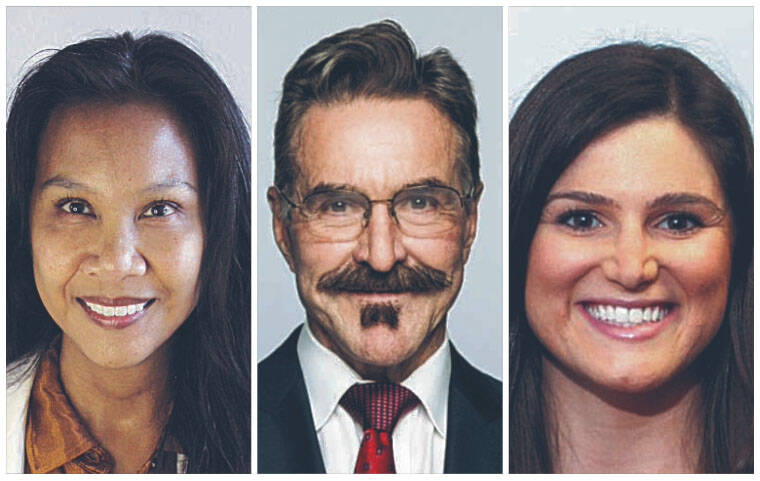Column: Taxes hamstring Hawaii health care

COURTESY PHOTOS
Elizabeth A. Ignacio, Jack Lewin and Rachel DiPasquale
Hawaii is known for its ethnic, cultural and religious diversity, which distinguishes us among the 50 states. We take pride in seeing our community as a beacon of justice and fairness reflected in our policies, especially in regard to health care. In 1974,we were the first state to establish mandatory employer-based health care coverage with the Hawaii Prepaid Health Care Act.
But today, we’re falling miserably short. The Native Hawaiian population, for example, has the shortest life expectancy and among the highest mortality rates. Our neighbor island and rural communities are experiencing the greatest shortage of physicians, nurses, dentists, and other health care professionals in our state.
The August 2023 Maui wildfires not only devastated a community, but also exacerbated an already serious workforce shortage and health care problems. The Maui physician shortage is now at 43%, with a 59-77% shortage in psychiatry alone. The February 2024 Maui Wildfire Exposure Study reports that 55% of survivors are living with depression, while 74% are experiencing respiratory issues.
And while the community at large has stepped up to help Lahaina, the deeper systemic issues, including health care, have yet to be addressed. This is essential for the long-term stability of our community; not just in Lahaina and Maui, but throughout our state.
One of the major issues is the unfair and burdensome general excise tax (GET) that private health care providers must pay — up to 4.5% of their gross income. The GET does not apply to hospitals, nor to physicians and other health care providers employed by hospitals and other large systems. And unlike other businesses, private practice health care providers are not legally permitted to pass on this additional tax to their Med-QUEST (Hawaii’s Medicaid), Medicare and TRICARE patients — not that most would.
Senate Bill 1035 would extend to private practice physicians, dentists and advanced practice registered nurses the same support already given to nonprofit hospitals and their healthcare professionals — exemption from the GET. Nonprofit hospitals and nonprofit health care providers struggle to make ends meet. Can you imagine the difficulty for private practice physicians and dentists to make payroll and pay rent, especially in rural areas where they lack economies of scale due to smaller populations?
Don't miss out on what's happening!
Stay in touch with breaking news, as it happens, conveniently in your email inbox. It's FREE!
How would SB 1035 benefit patients?
Simply put, more kupuna, high-risk patients, and neighbor island and rural communities would experience greater access to care, since a level tax playing field would decrease expenses for their community health care providers. In rural and neighbor island communities, most private practice health care providers wish to live and serve in their community. But they struggle to keep their doors open, often being forced to move to more urban areas, shift to employed practice, and even move out of state.
Improving access to community-based health care services will also decrease emergency and hospital care costs. When people cannot get care through regular means, e.g., their community-based primary care physician, many wait until they are so sick that they have to use the emergency room at the local hospital. This is very costly care, and in the case of Med-QUEST, the state must pay a 40% matching contribution to cover these costs.
We all know that the best care is in an out-patient setting where prevention is the rule, not in emergency rooms where care is necessarily more expensive as it focuses on acute cases. Without sufficient health care professionals in the “field,” more people will end up in the hospital.
We very much appreciate our elected officials for moving SB 1035 this far; we also realize that our state’s budget is under great strain. As health care leaders, we foresee that unless we start to address the underlying systemic problems, the health of our community will deteriorate, and costs will continue to rise exponentially. The GET exemption is one step; it’s something we can do right now. Let’s return justice and fairness to our health care system by providing the GET exemption to all health care providers.
Elizabeth A. Ignacio, M.D., is president of the Hawaii Medical Association; Jack Lewin, M.D., is administrator of the State Health Planning and Development Agency (SHPDA); Rachel DiPasquale, D.D.S., is president-elect of the Hawaii Dental Association.



